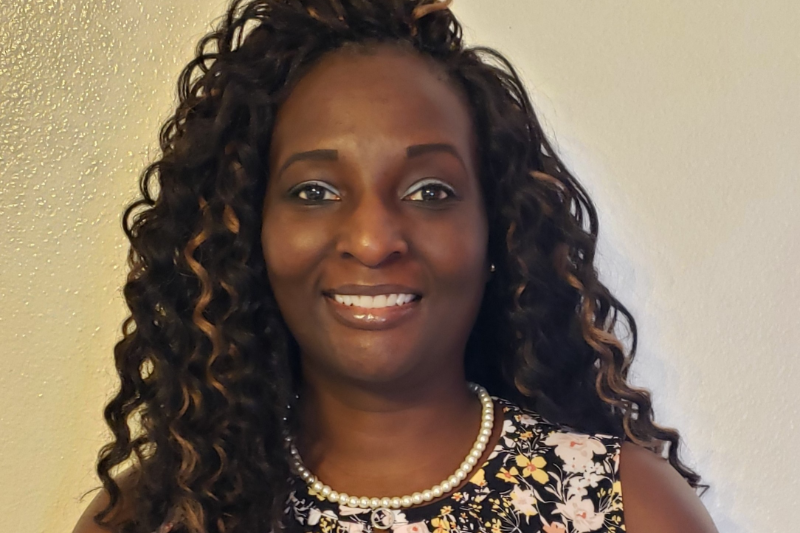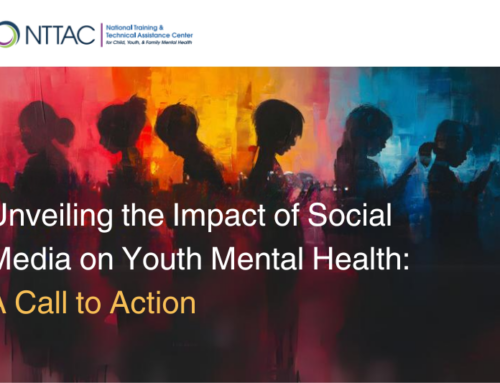Long before Dr. Tonicia Freeman-Foster earned her degrees or had experience working with clients, she had a burning passion to help others. From an early age, she aspired to be a nurse, doctor, and even a civil rights attorney to help people fight for their rights. Today, she is a change specialist with Change Matrix (CM), largely focusing her time on the SAMHSA-funded National Training & Technical Assistance Center (NTTAC). Her background in behavioral health and youth-driven care has been instrumental in her role, informing her holistic and innovative approaches to mental wellness among diverse youth and young adults.
In honor of May being Mental Health Awareness Month and May 7 being Children’s Mental Health Awareness Day, CM is highlighting her background, youth-driven approach, and advice for care providers to maintain their own mental health while helping others with theirs.
A Personal Mission
When asked why she gravitated toward this work, Tonicia answered quickly: it was a calling.
“I just knew that people needed equity and people needed to be able to receive the things they needed to help them to live their best lives, regardless of who they were,” she said.
When she got to high school, she got her first chance to explore career fields that might align with her passions. She participated in a health academy program in nursing that offered her real-world experience and ended up majoring in the subject. However, while nursing allowed her to provide direct care to others, she still felt that something was missing. She came to the conclusion that she wanted to help communities receive care on a larger scale.
“I changed my major to health science education, with a focus on community health,” Tonicia said. “Then, from that point, after I graduated, I started working in child welfare. I served as a child protective investigator.”
In that job, she began to understand the interconnectedness of the larger health system — and the inequities that often permeate it. Some people are given a pass, while others receive harsh consequences.
“I think that’s an experience that everyone needs to have, just being able to be in that role, which is scary,” Tonicia said. “You have a lot of power; you have the power to remove peoples’ kids. Just watching some of us who were very careful about that, and some that just didn’t think about it in the same way and inserted their own biases in it — I thought that that was problematic.”
Those experiences helped inform her holistic mindset when thinking about systems of care, and she applied that when she began working with communities impacted by HIV and AIDS by creating treatment plans and authorizing medical services.
All the while, she ensured that she understood the needs of her clients, offered them services that were reflective of their culture and other needs, and removed barriers to accessing them. From there, she moved into leadership roles and expanded into substance use and mental health services. Later, Tonicia got her master’s degree in organizational management and leadership and a doctorate in organizational leadership.
“I became a fan, I think, of how culture impacts peoples’ lives and how it impacts people’s outcomes in that, if there are inequities in an organization’s culture, that trickles down to the employees and, ultimately, the clients,” Tonicia said. “I’m just very keen and very aware of the things that people experience, I think. I’m also aware of my presence as a person of color and how I can impact that in a positive way.”
A Holistic Approach to Care
Throughout her career, Tonicia has worked extensively with youth and young adults. She’s prioritized a youth-driven approach to mental health care and other services. The secret to which, she says, begins with truly hearing a client’s needs.
“Just listening and asking people what they need in order to be successful [is valuable] and not assuming that you already know because you work with another client from that same neighborhood or one who looks like this person but listening and interacting with your clients as human beings and individuals, recognizing that all of them will have different needs,” she said. “They may have different circumstances that prevent them from reaching their goals, but most of them are individuals [who can meet their own needs when empowered and provided with the resources to do so].”
Beyond the skill of listening, Tonicia emphasizes that a collaborative focus for service providers is vital to truly equitable care. This was especially true in her experience when she served as the project director for the Florida Healthy Transitions project. She found that a large part of mental wellness revolves around “a sense of belonging in your community.”
“When you feel engaged with your community, the chances of you attempting to take your life or engage in crimes is lower because you feel like you belong and you have a sense of purpose and you’re an asset,” she said.
So, despite it not fitting the mold of “traditional” care, Tonicia’s team members organized a night out to eat with the young people they were providing services to.
“That was a big deal, to get dressed up and to go to a sit-down restaurant where you put a napkin in your lap, and you had a menu to order off of, and you sat with your peers and had conversation. I think we underestimate the power of seemingly small things like this,” she said. “Now [the young people say,] ‘I can apply for a job, and I have the confidence to speak during an interview because I feel important, and I feel a sense of value just in that little small thing.’”
At its core, effective care, and particularly youth mental health care, she said, boils down to viewing clients as “whole people.”
“Because if they’re worried about their light bill or where they’re going to live or worried about how they’re going to eat, counseling and therapy is good, but they’re just there physically and their minds are elsewhere until you address those other needs,” Tonicia said.
“Don’t dilute your sweet tea.”
That’s why the willingness to do the unconventional that provides long-term empowerment is something Tonicia advises every mental health care provider to consider — especially because treatment and mental health don’t always mean the same things to everyone, and ideas like therapy and medication carry various stigmas across diverse communities. However, she cautions providers not to “dilute your sweet tea” — meaning trying to be everything for everyone.
“I think it’s healthy [decreasing burnout] and powerful for both staff and clients to be able to access these resources in their communities,” she said. “We are diluting our talents if we are trying to meet every need that our clients have, instead of identifying culturally and age-appropriate providers in our communities who actually specialize in those services.
“Our goal should be to listen, assess, and connect. Our list of resources ultimately tells the story of how committed we are to the holistic well-being of our clients. It should be a living document that symbolizes our connectedness within our communities, and the relationships that we are cultivating. Ultimately, your resources should be diverse and limitless: who can a young person contact for reliable transportation, housing, education, bill assistance, spirituality, social support, a hot meal, mentorship, employment, clothing, leadership opportunities, physical health, fitness, etc. This is a whole person approach.”
That’s why partnerships between systems is critical and central to Tonicia’s approach, emphasizing that “no one wins when we work in silos.” Still, it’s not always smooth sailing.
“It’s a complicated relationship, and we have to understand how some systems have negatively impacted communities and as well as other systems, from a historical and a present-day lens,” she said. “Some communities have been hurt, destroyed, under-resourced, marginalized, and destabilized by systems. And now, some of these same systems are coming back saying, we’re here to help.”
She added that there remains a lot of distrust among communities and that “we cannot be upset or impatient during the process.” It begins with humility.
“[We have to] be authentic in our intentions and approach, take a step back and say to the individuals that we are working with, ‘How can I help? What would success look like, if we got this right? What things could potentially hinder our success? How can we overcome those collaboratively?’”
Learn more about Dr. Freeman-Foster and her work with NTTAC on our site or by visiting the NTTAC site.




